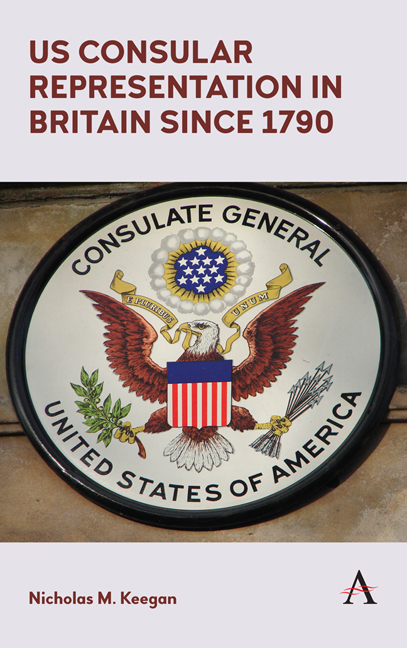Book contents
- Frontmatter
- Dedication
- Contents
- List of Illustrations
- Foreword
- Preface
- Acknowledgements
- Introduction
- PART 1
- PART 2
- PART 3
- Chapter Six Consular Posts and Consular Agencies in Major Cities
- Chapter Seven Belfast
- Chapter Eight Birmingham
- Chapter Nine Bradford
- Chapter Ten Bristol
- Chapter Eleven Cardiff
- Chapter Twelve Dublin
- Chapter Thirteen Dundee
- Chapter Fourteen Dunfermline
- Chapter Fifteen Edinburgh and Leith
- Chapter Sixteen Falmouth
- Chapter Seventeen Liverpool
- Chapter Eighteen London
- Chapter Nineteen Newcastle upon Tyne
- Chapter Twenty Southampton
- Chapter Twenty-One Stoke on Trent
- Chapter Twenty-Two An Evolving, Adaptive Service
- Appendix: Locations and Categories of Consular Offices
- Notes
- Sources
- Bibliography
- Index
Chapter Six - Consular Posts and Consular Agencies in Major Cities
from PART 3
Published online by Cambridge University Press: 21 June 2018
- Frontmatter
- Dedication
- Contents
- List of Illustrations
- Foreword
- Preface
- Acknowledgements
- Introduction
- PART 1
- PART 2
- PART 3
- Chapter Six Consular Posts and Consular Agencies in Major Cities
- Chapter Seven Belfast
- Chapter Eight Birmingham
- Chapter Nine Bradford
- Chapter Ten Bristol
- Chapter Eleven Cardiff
- Chapter Twelve Dublin
- Chapter Thirteen Dundee
- Chapter Fourteen Dunfermline
- Chapter Fifteen Edinburgh and Leith
- Chapter Sixteen Falmouth
- Chapter Seventeen Liverpool
- Chapter Eighteen London
- Chapter Nineteen Newcastle upon Tyne
- Chapter Twenty Southampton
- Chapter Twenty-One Stoke on Trent
- Chapter Twenty-Two An Evolving, Adaptive Service
- Appendix: Locations and Categories of Consular Offices
- Notes
- Sources
- Bibliography
- Index
Summary
An idea of the variety and extent of the United States consular presence in Britain, and Ireland up to independence in 1922, may be gained from the lists shown in the Appendix. The first offices were established in 1790 and over the years there was scarcely a city or town that did not have an American consular presence of some description, whether a consulate general, consulate, vice consulate, consular agency, or commercial agency. It would be difficult to provide a history of all of the offices. However, the 15 shown in Chapters 7 to 21 – Belfast, Birmingham, Bradford, Bristol, Cardiff, Dublin, Dundee, Dunfermline, Edinburgh and Leith, Falmouth, Liverpool, London, Newcastle upon Tyne, Southampton and Stoke on Trent – have been selected to give a representative sample from all the regions of the United Kingdom, plus Ireland up to 1922. The accounts in each of these micro-histories describe the individuals who staffed the offices, the nature of the business transacted, the office accommodation, mundane as well as important incidents, accommodation, routines, health, dangers faced during wartime, and closures (with the exception of the consulates in Edinburgh and Belfast, both of which have been established for more than two hundred years). All of which will, it is hoped, give a better understanding of this relatively unrecognized, but important, area of foreign relations. One feature that soon becomes noticeable in all of the accounts is the wide variety of previous occupations held by the early consuls who joined the original Consular Service – for example, lawyer, blacksmith, ship's figurehead carver, newspaper editor, army officer, politician, clergyman, rancher, pharmacist, worker in a reindeer enterprise, worker in paving and road construction. Such an interesting and diverse mix of backgrounds inevitably produced many ‘characters’ in the early Consular Service so that there was no stereotypical model of an American consul in those early days. Unlike, for example, in the British Consular Service and its offshoots – the China Consular Service and the Levant Consular Service – whose entrants were drawn largely from similar backgrounds and education and for the most part without the influence of political patronage. This may also have been true of members of the consular services of other European countries at the time. However, there is no denying that the histories of the consulates in these chapters make fascinating reading.
- Type
- Chapter
- Information
- US Consular Representation in Britain since 1790 , pp. 93 - 94Publisher: Anthem PressPrint publication year: 2018



